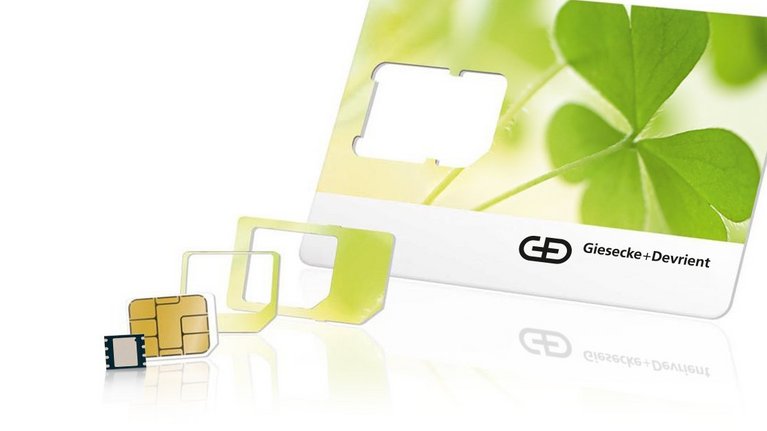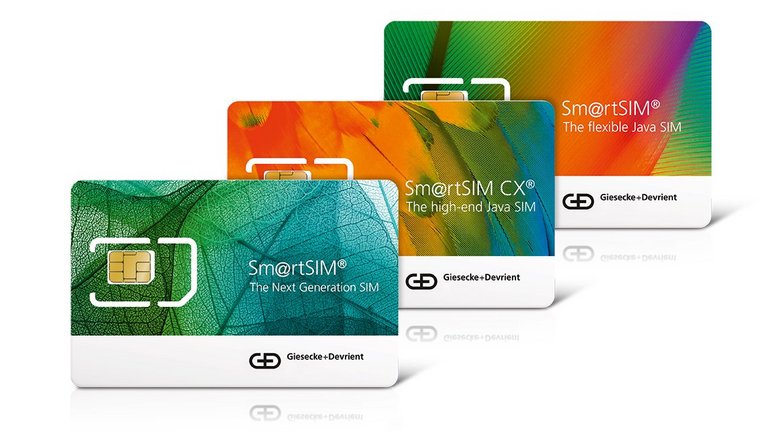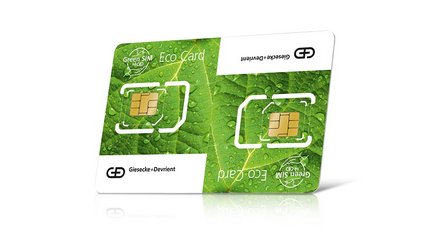
SIM: our cards are the ace for your game
The SIM card is a legendary mobile technology hero. It's used billions of times around the world daily and it's essential for our mobile digital lives. And it has had a significant and eventful history. The SIM card was a basic authentication tool, which enabled feature phones and smartphones to communicate, and developed into a multifunctional secure device. Today, it ensures more than the pure authentication to a network: data protection, mobile applications as well as services such as payment, transit, and digital car key, in addition to IoT-focused security applications.
The world’s first commercial SIM card was launched in 1991. Our company was, and still is, a major force in defining international SIM standards. And so, at G+D, we can proudly say that we have been part of the SIM invention. And we were there at every step of the development: The network technology evolution, from early GSM standards to today’s 5G, the size reduction, from credit card size to SMD but also fundamental new technologies such as the eSIM management. We've always had the right plan for your business model – so that you, in turn, can best serve your customers.
SIMs for mobile networks operators
With our Sm@rtSIM® product families, any mobile network operator requirement can be met. We cover all the network technologies and network generations. Java-based, these cards are modular and come in a range to meet various requirements, from basic to high-end. Needless to say, the latest 5G SIM cards are part of our portfolio. Our SIM cards enable mobile operators to expand their service offerings for banks, public transit authorities, and other service providers.

Our Sm@rtSIM® solution has received approval from companies including EMVCo, American Express, Mastercard and Visa, confirming that it meets the requirements for secure payment systems. From a technical perspective, mobile network operators which issue Sm@rtSIMs to their customers now have the opportunity to set up additional protected areas, the so-called security domains. Sm@rtSIM also supports the transit applications MIFARE®, CIPURSE™, and Calypso.
SIMs for IoT
Apart from the ubiquitous smartphone, we see that more and more devices are being connected. Today, devices including basic sensors, meters, fleets containers and agriculture monitors, are connected and exchange information. SIM plays a crucial role in the IoT landscape. IoT device manufacturers and Machine-to Machine (M2M) service providers must fulfill a broad range of requirements – from ruggedness to miniature or virtual form factors, to low power consumption. Dedicated IoT SIM products not only offer the benefit of network protection to MNOs, but also protect IoT data and help tackle the far-reaching concerns of IoT device lifecycle management.

We offer SIM solutions for all IoT-related requirements:
All cellular connected IoT devices have a SIM, no matter their size or shape. It is there to secure and enable communication and shared data. IoT SIMs used in industrial IoT have to meet specific requirements. These are, for example, a higher temperature range, a longer lifetime, and more erase/write cycles. It means in fact that today the SIM is an inevitable part of IoT.
SIMs for LPWAN and Cellular NB-IoT network
For Low Power Wide Area Network (LPWAN) and Cellular NB-IoT networks, we offer a dedicated SIM. It is ideal to support the low power requirements of these networks. Additionally, it enables an end-to-end security solution, which secures data from the IoT end point, through the network onto the application server/cloud.
Embedded SIM – eSIM / eUICC
The eSIM or eUICC is a SIM which is typically soldered into the device and supports eSIM Management to remotely manage multiple SIM profiles over the air. Thanks to the latter, it doesn't have to be physically replaced if the network operator changes. At the same time, eSIMs fulfill IoT-related needs, e.g., durability, heat and vibration resistance.
Converged solutions
The converged solution integrates SIM and multiple other security applications on a single security chip, e.g. for mobile connectivity, mobile payment and transit. It combines two separate components, the eUICC (embedded Universal Integrated Circuit Card) and the eSE (embedded Secure Element) on a single chip. The solution meets all relevant specifications and certification requirements of the GSMA as well as international payment and transit organizations.
SIMs for automotive
Automotive SIMs must comply with several industry-specific requirements, such as higher temperature range, longer lifetime and more erase/write cycles. Also, the automotive industry often needs automotive grade chips. Likewise, specific requirements for Quality Assurance, including IATF 16949, must also be met.

The SIM is the engine that drives secure connectivity. The major automotive manufacturers choose to invest in embedded SIM technologies (eSIM management) to ensure that connectivity performs in the most flexible and secure way possible.
Embedded SIMs (eSIMs) are the state-of the-art path to enable automotive connectivity. Secure, trusted connectivity is critical to the success of the connected vehicle ecosystem. The automotive market leads the adoption of eSIM technologies around the world. This rise in adoption, with a correlating increase in connected car production, is proof that the eSIM is a critical component for the connected car.
The eSIM is typically used to enable the automated emergency call function. Our products are certified for eCALL and ERA-GLONASS. Further it enables plenty of data related services for the car OEM but as well for the driver.
Sustainable SIM cards
A growing environmental awareness in the global society and an increasing number of enterprises raises the demand for eco-friendly products as well as sustainable solutions and services.

Green SIM cards
Among the opportunities for the telecommunications industry to act on climate issues is a review of SIM card production. Although the SIM card is tiny in size, it is a significant contributor to plastic waste. We have developed a green SIM card offering, which is based on two main goals: the reduction of resource consumption and the use of more environmentally-friendly material.

Green eSIM
We highly recommend the use of eSIMs, which completely avoids using plastics and even further reduces the carbon footprint. Already soldered to the hardware of a mobile device these embedded SIM modules are just a tiny silicon and will no longer be physically exchanged. Increased sustainability, higher flexibility and ease of use are only a few reasons why the global eSIM adoption is accelerating fast.
Form factors: from small to smaller
Size does matter: to be able to manage billions of connected customers, SIMs are available in a variety of shapes and security grades. The size and form factor of the SIM card evolved over the years. Originally a credit card size, it became available as a small plug-in, then we saw SMD modules and even integrated solutions, which no longer use a discrete SIM hardware.

The increased diversity of mobile devices has created an advancing range of SIM form factors. Depending on the mobile device, Plug-in SIM (2FF, 3FF or 4FF) cards, soldered (e.g. MFF2, VQFN32, WLCSP) or even integrated SIMs are required. All SIMs, no matter the shape, are GSMA compatible according to all common specifications.
Plug-in SIM cards
In addition to typical credit card sized SIM cards (ID1), we offer alternatives with half or even quarter sized SIM card bodies, which reduce the amount of plastic per card by half or even three quarters. This leads to a significant improvement in sustainability.
M2M SIM cards
All cellular IoT devices such as power meters, sensors, tracking devices or even industrial machines need a SIM to connect to a mobile network. Depending on the usage conditions, the SIM has to be robust and withstand external impacts such as humidity, heat, shock and vibrations. To match the individual needs, we offer SIMs in 3 different grades: consumer grade, industrial/enterprise grade, and automotive grade. M2M SIM cards are available either in 2FF, 3FF (Micro SIM) or 4FF (Nano SIM) and as a solderable module.
SMD form factors
SIMs are also available in various SMD form factors. The most common and standardized is the MFF2 (Machine Form Factor 2), which supports the ISO 7816 interface. The VQFN32 (Very thin Quad Flat No leads) package offers, for example, the option to connect the chip via alternative interfaces e.g. I2C. The WLCSP (Wafer Level Chip Scale Package) can be useful, especially for devices with space limitations. In this case, the silicon is directly mounted to the board. Other form factors are available on request.
More insights into SIM
Reduce complexity and increase flexibility
With our proven solutions, you can create a straightforward and convenient customer experience. We provide trusted and secure end-to-end solutions comprising classic pluggable SIMs, embedded SIMs (eSIMs), embedded operating systems (eOS) for smart card controllers, lifecycle management services, and SaaS solutions with the highest service levels.
Get in touch
If you have any questions about our end-to-end business solutions or about our SecurityTech company, seek expert advice, or want to give us your feedback, our team is here to support you, anytime.












